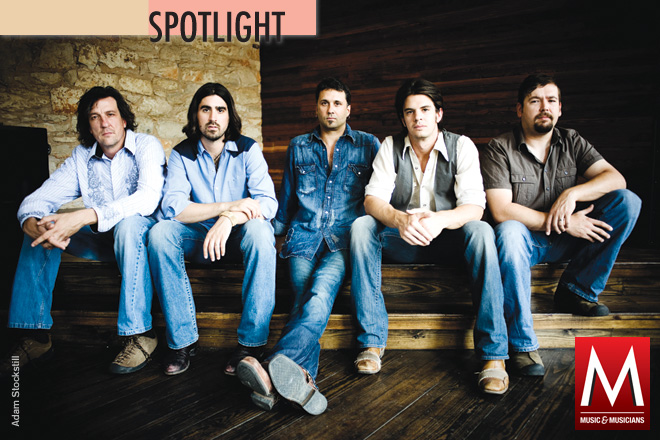BAND OF HEATHENS
The secret to this Austin collective’s success? Don’t plan, just play
It’s noon in Austin, but the Band of Heathens’ Gordy Quist sounds like he’s still sleepy. “I’m a bit hazy,” he says by way of apology. “It’s been a long 24 hours.” With upward of 200 gigs a year, the group’s devotion to its packed-out schedule comes naturally by now. In fact, the Band of Heathens was quite literally born on stage—the group came about as the result of a series of Wednesday night solo singer-songwriter showcases at Austin club Momo’s featuring Quist, Ed Jurdi and Colin Brooks, each a talented singer, songwriter and multi-instrumentalist.
“It certainly wasn’t planned,” Quist says. “We were playing one after another in separate bands and didn’t even know each other. After we met at Momo’s it became a loose jam session, and we ended up making it one long rotating set. It was just a scene, all these musicians hanging out on Wednesday nights.” Bass player Seth Whitney was added to the lineup, followed by drummer John Chipman in 2007.
The Heathens elected to make two live albums before ever setting foot in a studio together. “There were no rehearsals,” Quist says. “We threw songs out on the fly and the show became our rehearsal. We had a live audience and a good energy, so we said, ‘Shoot, let’s record one of these,’ because we thought it would be fun to document. That seems the nature of this band. We don’t plan things very much.”
Even the group’s name happened by chance. “We referred to the Wednesday-night gig as the Good Time Supper Club,” Quist says. “It was just a joke. But somebody probably noticed the massive consumption of tequila on the stage and thought it would be funny to call us the Band of Heathens, so when we released the first live album [Live from Momo’s, 2006], that’s what stuck.”
That loose, everything-goes attitude informs their three studio albums as well, including the new Top Hat Crown & The Clapmaster’s Son, produced by George Reiff. The Heathens survey a broad musical terrain on the album, one far wider than the “Americana” tag with which the group is often pinned. “American music is much broader than that,” Quist says. “There’s a lot of blues and R&B in that spectrum that often doesn’t get represented. To us, it’s just rock ’n’ roll, but we’re also trying to do something different.”
–Lee Zimmerman




comment closed